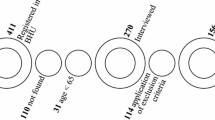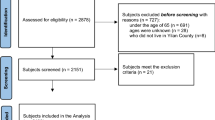Abstract
Objectives: (1) To describe body composition of the frail elderly, (2) To relate lean body mass to muscle strength and functional ability, and (3) To assess temporal stability of strength measures and index of functional ability.
Design: Cross-sectional study.
Setting: Community-dwelling.
Subjects: Thirty frail elderly women (81.5±7 y) recruited from residences or out-patient facilities.
Methods: Total body fat and fat-free mass (FFM) were determined using multi-frequency bioelectrical impedance analysis and predicted from anthropometry. Handgrip strength, biceps and quadriceps strength, functional capacities (Timed ‘Up & Go’) as well as self-perceived health and functional status were measured. Reliability was assessed using two separate observations made one week apart by the same examiner.
Results: Mean height, weight and body mass index were 1.52±0.04 m, 60.4±10.7 kg and 26.0±4.8 kg/m2 respectively. FFM (34.1±4.6 kg) was lower than previous reports for autonomous elderly females and associated with all measures of muscle strength (Pearson’s r=0.42–0.62, P≤0.02), but not with performance on the Timed ‘Up & Go’ or self-perceived health and functional status. Strength measures correlated significantly with different subscales of self-perceived functional capacities and were significantly lower among women with a low %FFM (n=19) and those reporting pain (n=11) as compared to other women. Excellent temporal stability for muscle and functional measures was observed (ICC=0.80–0.90).
Conclusions: Muscle strength was strongly related to FFM in free-living frail elderly women especially in the absence of pain.
Sponsorship: Abbott Laboratories, Limited, Saint-Laurent (Québec) Canada.
This is a preview of subscription content, access via your institution
Access options
Subscribe to this journal
Receive 12 print issues and online access
$259.00 per year
only $21.58 per issue
Buy this article
- Purchase on SpringerLink
- Instant access to full article PDF
Prices may be subject to local taxes which are calculated during checkout
Similar content being viewed by others
Author information
Authors and Affiliations
Rights and permissions
About this article
Cite this article
Payette, H., Hanusaik, N., Boutier, V. et al. Muscle strength and functional mobility in relation to lean body mass in free-living frail elderly women. Eur J Clin Nutr 52, 45–53 (1998). https://doi.org/10.1038/sj.ejcn.1600513
Received:
Revised:
Accepted:
Published:
Issue Date:
DOI: https://doi.org/10.1038/sj.ejcn.1600513
Keywords
This article is cited by
-
C677T gene polymorphism of MTHFR and metabolic syndrome: response to dietary intervention
Journal of Translational Medicine (2014)
-
Genome-wide association study of copy number variation identified gremlin1 as a candidate gene for lean body mass
Journal of Human Genetics (2012)
-
Does chair type influence outcome in the timed “up and go” test in older persons?
The journal of nutrition, health & aging (2010)
-
The MTHFR gene polymorphism is associated with lean body mass but not fat body mass
Human Genetics (2008)
-
The physical functional capacity of frail elderly persons undergoing ambulatory rehabilitation is related to their nutritional status
The Journal of Nutrition, Health & Aging (2008)



